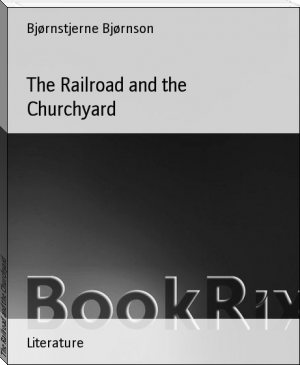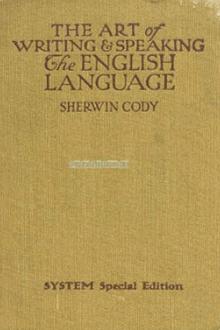The Railroad and the Churchyard, Bjørnstjerne Bjørnson [trending books to read .TXT] 📗

- Author: Bjørnstjerne Bjørnson
Book online «The Railroad and the Churchyard, Bjørnstjerne Bjørnson [trending books to read .TXT] 📗». Author Bjørnstjerne Bjørnson
to be satisfied now, with the family's honor sounding forth above his grave; who else had such a monument? But yet, what mean these two great eyes of fire? This hissing, roaring, is no longer the locomotive, for see! it comes from the churchyard directly toward the house: an immense procession! The eyes of fire are his grandfather's, and the train behind are all the dead. It advances continually toward the house, roaring, crackling, flashing. The windows burn in the reflection of dead men's eyes ... he made a mighty effort to collect himself, "For it was a dream, of course, only a dream; but let me waken! ... See: now I am awake; come, ghosts!"
And behold: they really come from the churchyard, overthrowing road, rails, locomotive and train with such violence that they sink in the ground; and then all is still there, covered with sod and crosses as before. But like giants the spirits advanced, and the hymn, "Let the dead have rest!" goes before them. He knows it: for daily in all these years it has sounded through his soul, and now it becomes his own requiem; for this was death and its visions. The perspiration started out over his whole body, for nearer and nearer,--and see there, on the window-pane there, there they are now; and he heard his name. Overpowered with dread he struggled to shout, for he was strangling; a dead, cold hand already clenched his throat, when he regained his voice in a shrieking "Help me!" and awoke. At that moment the window was burst in with such force that the pieces flew on to his bed. He sprang up; a man stood in the opening, around him smoke and tongues of fire.
"The house is burning, Lars, we'll help you out!"
It was Canute Aakre.
When again he recovered consciousness, he was lying out in a piercing wind that chilled his limbs. No one was by him; on the left he saw his burning house; around him grazed, bellowed, bleated, and neighed his stock; the sheep huddled together in a terrified flock; the furniture recklessly scattered: but, on looking around more carefully, he discovered somebody sitting on a knoll near him, weeping. It was his wife. He called her name. She started.
"The Lord Jesus be thanked that you live," she exclaimed, coming forward and seating herself, or rather falling down before him: "O God! O God! now we have enough of that railroad!"
"The railroad?" he asked: but ere he spoke, it had flashed through his mind how it was; for, of course, the cause of the fire was the falling of sparks from the locomotive among the shavings by the new side-wall. He remained sitting, silent and thoughtful; his wife dared say no more, but was trying to find clothes for him: the things with which she had covered him, as he lay unconscious, having fallen off. He received her attentions in silence, but as she crouched down to cover his feet, he laid a hand upon her head. She hid her face in his lap, and wept aloud. At last he had noticed her. Lars understood, and said:
"You are the only friend I have."
Although to hear these words had cost the house, no matter, they made her happy; she gathered courage and said, rising and looking submissively at him:
"That is because no one else understands you."
Now again they talked of all that had transpired, or rather he remained silent, while she told about it. Canute Aakre had been first to perceive the fire, had awakened his people, sent the girls out through the parish, while he himself hastened with men and horses to the spot where all were sleeping. He had taken charge of extinguishing the fire and saving the property; Lars himself he had dragged from the burning room and brought him here on the left, to the windward,--here, out on the churchyard.
While they were talking of all this, some one came driving rapidly up the road and turned off toward them; soon he alighted. It was Canute, who had been home after his church-wagon; the one in which so many times they had ridden together to and from the parish meetings. Now Lars must get in and ride home with him. They took each other by the hand, one sitting, the other standing.
"You must come with me now," said Canute, Without reply Lars rose: they walked side by side to the wagon. Lars was helped in: Canute seated himself by his side. What they talked about as they rode, or afterward in the little chamber at Aakre, in which they remained until morning, has never been known; but from that day they were again inseparable.
As soon as disaster befalls a man, all seem to understand his worth. So the parish took upon themselves to rebuild Lars Hogstad's houses, larger and handsomer than any others in the valley. Again he became chairman, but with Canute Aakre at his side, and from that day all went well.
Imprint
And behold: they really come from the churchyard, overthrowing road, rails, locomotive and train with such violence that they sink in the ground; and then all is still there, covered with sod and crosses as before. But like giants the spirits advanced, and the hymn, "Let the dead have rest!" goes before them. He knows it: for daily in all these years it has sounded through his soul, and now it becomes his own requiem; for this was death and its visions. The perspiration started out over his whole body, for nearer and nearer,--and see there, on the window-pane there, there they are now; and he heard his name. Overpowered with dread he struggled to shout, for he was strangling; a dead, cold hand already clenched his throat, when he regained his voice in a shrieking "Help me!" and awoke. At that moment the window was burst in with such force that the pieces flew on to his bed. He sprang up; a man stood in the opening, around him smoke and tongues of fire.
"The house is burning, Lars, we'll help you out!"
It was Canute Aakre.
When again he recovered consciousness, he was lying out in a piercing wind that chilled his limbs. No one was by him; on the left he saw his burning house; around him grazed, bellowed, bleated, and neighed his stock; the sheep huddled together in a terrified flock; the furniture recklessly scattered: but, on looking around more carefully, he discovered somebody sitting on a knoll near him, weeping. It was his wife. He called her name. She started.
"The Lord Jesus be thanked that you live," she exclaimed, coming forward and seating herself, or rather falling down before him: "O God! O God! now we have enough of that railroad!"
"The railroad?" he asked: but ere he spoke, it had flashed through his mind how it was; for, of course, the cause of the fire was the falling of sparks from the locomotive among the shavings by the new side-wall. He remained sitting, silent and thoughtful; his wife dared say no more, but was trying to find clothes for him: the things with which she had covered him, as he lay unconscious, having fallen off. He received her attentions in silence, but as she crouched down to cover his feet, he laid a hand upon her head. She hid her face in his lap, and wept aloud. At last he had noticed her. Lars understood, and said:
"You are the only friend I have."
Although to hear these words had cost the house, no matter, they made her happy; she gathered courage and said, rising and looking submissively at him:
"That is because no one else understands you."
Now again they talked of all that had transpired, or rather he remained silent, while she told about it. Canute Aakre had been first to perceive the fire, had awakened his people, sent the girls out through the parish, while he himself hastened with men and horses to the spot where all were sleeping. He had taken charge of extinguishing the fire and saving the property; Lars himself he had dragged from the burning room and brought him here on the left, to the windward,--here, out on the churchyard.
While they were talking of all this, some one came driving rapidly up the road and turned off toward them; soon he alighted. It was Canute, who had been home after his church-wagon; the one in which so many times they had ridden together to and from the parish meetings. Now Lars must get in and ride home with him. They took each other by the hand, one sitting, the other standing.
"You must come with me now," said Canute, Without reply Lars rose: they walked side by side to the wagon. Lars was helped in: Canute seated himself by his side. What they talked about as they rode, or afterward in the little chamber at Aakre, in which they remained until morning, has never been known; but from that day they were again inseparable.
As soon as disaster befalls a man, all seem to understand his worth. So the parish took upon themselves to rebuild Lars Hogstad's houses, larger and handsomer than any others in the valley. Again he became chairman, but with Canute Aakre at his side, and from that day all went well.
Imprint
Publication Date: 09-01-2010
All Rights Reserved
Free e-book «The Railroad and the Churchyard, Bjørnstjerne Bjørnson [trending books to read .TXT] 📗» - read online now
Similar e-books:





Comments (0)